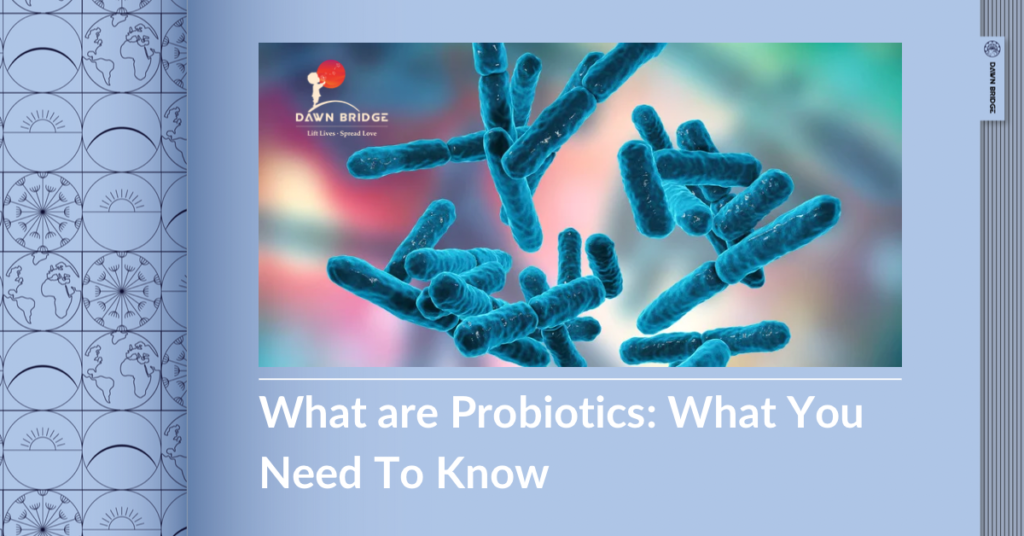Probiotics are live microorganisms that can maintain or improve normal microflora in the body and improve microbial balance, particularly in the gastrointestinal tract. They consist of Saccharomyces boulardii yeast or lactic acid bacteria. They are generally regulated as dietary supplements and foods.
How do probiotics work?
- They can lower intestinal pH
- They can decrease colonisation and invasion by pathogenic organisms
- They can modify the host immune response
- They can participate in the metabolism and absorption of nutrients, including carbohydrates and proteins, bile acid, vitamins, and other bioactive compounds.
- They can help to mature the neuroendocrine system and immune system.
Types of Probiotics
Probiotics are available as single microbial strains (e.g., Bacillus clausii, Lactobacillus) or as a mix of multiple strains of Lactobacillus (Acidophilus, sporogenes, lactis, reuteri RC-14, GG, and L.plantarum 299v), Bfidobacterrium (bfidum, longum, infantis), Streptococcus (thermophilus, lactis, fecalis), Saccharomyces boulardii.
Food Sources of Probiotics
Foods that contain probiotics include:
- Yogurt
- Kefir
- Fermented cheeses, such as buttermilk cheese and cottage cheese
- Kimchi –
- Raw sauerkraut
- Tempeh
- Miso
- Kombucha
- Natto
- Lacto-fermented vegetables, such as pickles
Probiotics and Special Needs
Autism spectrum disorder (ASD): It is suggested that children with ASD may have altered function of the gut-brain axis. Several studies show that the administration of probiotics amended the core symptoms associated with ASD, but further detailed research needs to be conducted.
- Attention-deficit/hyperactivity disorder(ADHD): The evidence is still scanty and heterogeneous. Some studies show that the probiotic supplement will help cognition function in children with ADHD.
- Cerebral palsy: In rat models, Saccharomyces boulardii could reduce rats’ inflammatory levels and improve abnormal behaviour.
Probiotics and other medical conditions
Prevent antibiotic-associated diarrhoea, for example, Clostridium difficle infection, traveller’s diarrhoea: Working Group(WG) from Europe suggested probiotics strains of Lactobacillus rhamnosus GG or Saccharomyces boulardii can be used for Clostridium difficile-associated diarrhoea.
- Prevent inflammatory bowel diseases such as irritable bowel syndrome, ulcerative colitis, and Crohn’s disease: It is hypothesised that complex interactions between genetics, environmental factors, and the host immune system lead to disrupted immune response and chronic inflammation in the gastrointestinal tract. Using probiotics to treat dysbiosis may help relieve inflammatory bowel disease symptoms.
- Prevent vulvovaginal candidiasis: A study shows that probiotics are helpful in the prevention of oral and vulvovaginal candidiasis after post antibiotics and corticosteroids.
Caution
- Bacteria-derived probiotics should be separated from antibiotics for at least 2 hours.
With this, the utilisation of probiotics can be maximised in the body.
- Probiotics should be used cautiously in critically ill patients, severely immunocompromised, or those with central venous lines.
Critical illnesses such as cancer and drug therapy create a hostile environment in the gut and then alter the microflora favouring pathogens’ growth. Scientific evidence shows that using probiotics may have them to reduce or eliminate potential pathogens and toxins and stimulate gut motility. With the help of probiotics, gastrointestinal flora became normalised and increased the host’s immune defence of the host. Thus, this explains the studies which show that long term administration of probiotics will decrease the rate of infection and severe sepsis.
Conclusion
Ask your doctor if taking probiotics is a good idea for you. In general, probiotic foods and supplements are thought to be safe for most people, though some people with immune system problems or other serious health conditions shouldn’t take them.
Before you start any supplements, make sure you talk to your healthcare provider. Your provider may be able to point you in the right direction, helping you figure out the best probiotic to take, how much to take and when to take it. A conversation is always worth the time when it concerns your health.
References:
1. Williams NT. Probiotics. Am J Health Syst Pharm. 2010 Mar 15;67(6):449-58. doi: 10.2146/ajhp090168. PMID: 20208051.
2.Sivamaruthi BS, Suganthy N, Kesika P, Chaiyasut C. The Role of Microbiome, Dietary Supplements, and Probiotics in Autism Spectrum Disorder. Int J Environ Res Public Health. 2020 Apr 12;17(8):2647. doi: 10.3390/ijerph17082647. PMID: 32290635; PMCID: PMC7215504.
3.Checa-Ros A, Jeréz-Calero A, Molina-Carballo A, Campoy C, Muñoz-Hoyos A. Current Evidence on the Role of the Gut Microbiome in ADHD Pathophysiology and Therapeutic Implications. Nutrients. 2021 Jan 16;13(1):249. doi: 10.3390/nu13010249. PMID: 33467150; PMCID: PMC7830868.
4.Guo Q, Goldenberg JZ, Humphrey C, El Dib R, Johnston BC. Probiotics for the prevention of pediatric antibiotic-associated diarrhoea. Cochrane Database Syst Rev. 2019 Apr 30;4(4):CD004827. doi: 10.1002/14651858.CD004827.pub5. PMID: 31039287; PMCID: PMC6490796.
5.Szajewska H, Canani RB, Guarino A, Hojsak I, Indrio F, Kolacek S, Orel R, Shamir R, Vandenplas Y, van Goudoever JB, Weizman Z; ESPGHAN Working Group for ProbioticsPrebiotics. Probiotics for the Prevention of Antibiotic-Associated Diarrhea in Children. J Pediatr Gastroenterol Nutr. 2016 Mar;62(3):495-506. doi: 10.1097/MPG.0000000000001081. PMID: 26756877.
6.Tao D, Zhong T, Pang W, Li X. Saccharomyces boulardii improves the behaviour and emotions of spastic cerebral palsy rats through the gut-brain axis pathway. BMC Neurosci. 2021 Dec 7;22(1):76. doi: 10.1186/s12868-021-00679-4. PMID: 34876019; PMCID: PMC8653608.
7.Elangovan A, Fischer M. When to use probiotics in luminal gastrointestinal disorders? Curr Opin Clin Nutr Metab Care. 2020 Sep;23(5):336-343. doi: 10.1097/MCO.0000000000000674. PMID: 32657791.
8.Shenoy A, Gottlieb A. Probiotics for oral and vulvovaginal candidiasis: A review. Dermatol Ther. 2019 Jul;32(4):e12970. doi: 10.1111/dth.12970. Epub 2019 May 30. PMID: 31112355.

